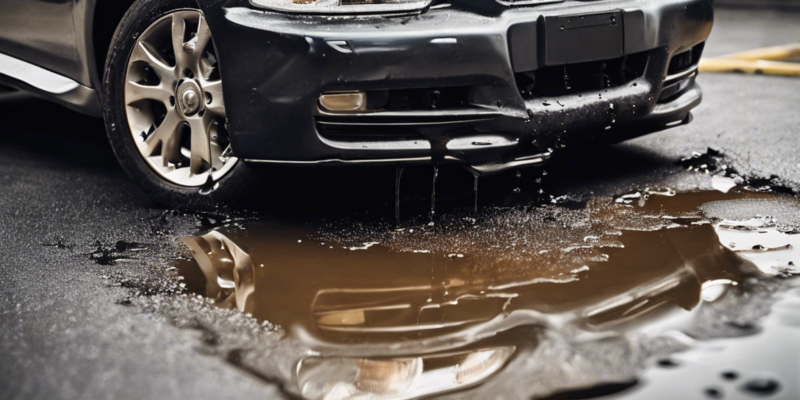Oil leaks in cars can be a common issue that many drivers encounter at some point. Not only can an oil leak lead to messy stains in your garage or driveway, but it can also indicate a more serious problem with your vehicle that needs prompt attention. In this blog post, we will explore common causes of car oil leaks, how to identify an oil leak, steps to take when you notice a leak, and prevention and maintenance tips to keep your car running smoothly.
Common Causes of Car Oil Leaks
Oil leaks can stem from various parts of the car’s engine and components. Some common causes of oil leaks include:
Worn Gaskets or Seals
Over time, the gaskets and seals in your car’s engine can wear out and develop cracks, which can lead to oil leaks.
Loose or Damaged Oil Drain Plug
If the oil drain plug is not tightened properly or is damaged, oil can leak out from the oil pan.
Oil Pan Damage
Rocks, debris, or road hazards can cause damage to the oil pan, resulting in oil leaks.
Valve Cover Gasket Leak
The valve cover gasket seals the valve cover to the engine. If this gasket is faulty, oil can leak out.
Oil Filter Damage
A damaged or incorrectly installed oil filter can cause oil to leak from the filter housing.
Identifying an Oil Leak
It is essential to detect oil leaks early to prevent any potential engine damage. Here are some signs that indicate your car may have an oil leak:
- Puddles or Stains: Check for oil puddles or stains under your parked car.
- Burnt Oil Smell: If you notice a burnt oil smell while driving, it could signify an oil leak.
- Low Oil Level: Regularly check your oil levels. A sudden drop in oil level may indicate a leak.
- Smoke or Burning Odor: If you see smoke coming from under the hood or smell burning oil, it could be a sign of an oil leak.
Steps to Take When You Notice a Leak
If you suspect that your car has an oil leak, here are some steps to take to address the issue:
- Locate the Leak: Identify the source of the leak by looking under the car and inspecting the engine components.
- Check the Oil Level: Top up the oil level if it is low to prevent engine damage.
- Tighten or Replace Components: If the leak is due to loose or damaged components, tighten or replace them as needed.
- Clean the Engine: Remove any oil residue from the engine and surrounding areas to prevent further leaks.
- Monitor the Leak: Keep an eye on the oil level and check for any new leaks to ensure the issue is resolved.
Prevention and Maintenance Tips
To prevent oil leaks and ensure your car’s engine stays in good condition, consider the following tips:
- Regular Inspections: Perform regular inspections of your engine and look out for any signs of leaks.
- Change Oil Regularly: Follow the manufacturer’s guidelines for oil changes to maintain optimal engine lubrication.
- Use High-Quality Oil: Use high-quality engine oil to reduce the risk of leaks and engine damage.
- Replace Gaskets and Seals: Replace worn gaskets and seals to prevent leaks.
- Avoid Overfilling: Overfilling the oil can lead to pressure build-up and leaks. Follow the recommended oil level.
- Keep Engine Clean: A clean engine is easier to inspect for leaks. Regularly clean the engine to spot any issues early on.
Frequently Asked Questions (FAQs)
-
Can I continue driving if my car has an oil leak?
It is not recommended to drive your car with an oil leak as it can lead to engine damage. Top up the oil level and address the leak promptly. -
How much does it cost to repair an oil leak in a car?
The cost of repairing an oil leak can vary depending on the cause of the leak and the extent of the damage. It is best to consult a mechanic for an accurate estimate. -
Is an oil leak a sign of a serious engine problem?
While some oil leaks may be minor, they can indicate underlying issues with the engine that need to be addressed to prevent further damage. -
Can I use stop-leak products to fix an oil leak in my car?
Stop-leak products are temporary solutions and may not fix the root cause of the leak. It is advisable to have the leak properly diagnosed and repaired by a professional. -
How often should I check my car for oil leaks?
It is recommended to check your car for oil leaks regularly, especially during routine maintenance checks or when you notice any symptoms of a leak.
By understanding the causes of oil leaks, knowing how to identify them, taking prompt action when a leak is detected, and following preventive maintenance measures, you can keep your car running smoothly and prevent costly engine damage. Regular inspection, proper maintenance, and timely repairs are key to ensuring your vehicle’s longevity and performance.

Comments